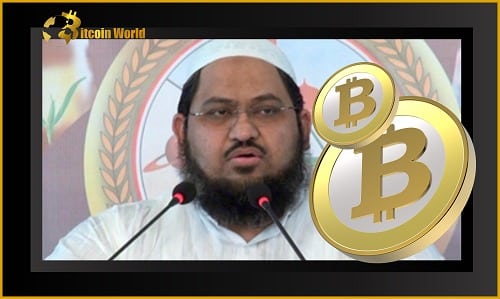The world of cryptocurrency is rapidly evolving, sparking discussions across various sectors, including the realm of Islamic finance. A recent conference in Pakistan brought together Islamic scholars to delve into the complex question: Are digital currencies like Bitcoin permissible under Islamic law (Sharia)? Let’s explore the insights shared by these experts and understand the nuances of their perspectives.
What are Islamic Scholars Saying About Bitcoin and Crypto?
According to a recent report, prominent Islamic scholar Mufti Irshad Ahmad Ijaz has made a significant statement: digital currencies are not inherently ‘counterfeit cash’ from an Islamic perspective. This is a crucial initial step in the conversation, suggesting that crypto isn’t automatically dismissed as illegitimate. However, Mufti Ijaz emphasized that the permissibility of cryptocurrency hinges on meeting specific criteria aligned with Islamic principles.
Speaking at a cryptocurrency conference in Pakistan, organized by the University of Karachi and the Al-Asr Foundation, Mufti Ijaz urged the Pakistani government to play a proactive role in clarifying the ambiguities surrounding cryptocurrency use. This call to action highlights the need for clear guidelines and regulations to navigate the intersection of Islamic finance and the digital economy.
Adding to the discourse, scholar Ishaq Alam stressed the importance of adaptability. He pointed out that the world is undeniably moving towards a digital future, and Islamic academics must acknowledge this shift. New eras bring new challenges and require fresh perspectives. Alam believes that recognizing this transition is essential for scholars to offer relevant and practical guidance to those engaging with digital currencies.
Mufti Owais Paracha: Bitcoin’s Success Lies in Innovation and Technology
Mufti Owais Paracha, identified as a crypto expert in the report, echoed these sentiments, offering a historical perspective. He highlighted the failures of previous attempts to create digital money and contrasted them with the groundbreaking success of Satoshi Nakamoto’s Bitcoin.
Why has Bitcoin succeeded where others failed? According to Mufti Paracha, Bitcoin’s triumph lies in its innovative blend of:
- Cryptography: Ensuring security and decentralization through advanced encryption techniques.
- Established Procedures: Incorporating proven principles from prior currency systems, but in a digital format.
This combination of cutting-edge technology and time-tested financial concepts is what, in Paracha’s view, has propelled Bitcoin to the forefront of the digital currency revolution.
The Need for Deeper Research and Understanding
The scholars at the conference unanimously emphasized the critical need for more in-depth research into digital currencies. This call for further study underscores the complexity of the issue and the desire to provide well-informed guidance.
Why is more research so important?
- Providing Informed Advice: Thorough research will equip scholars to offer practical and religiously sound advice to individuals and institutions dealing with digital currencies.
- Addressing Evolving Challenges: The crypto landscape is constantly changing. Ongoing research is essential to stay ahead of new developments and their implications for Islamic finance.
This focus on research demonstrates a commitment to understanding cryptocurrency from an Islamic perspective, rather than simply issuing blanket prohibitions.
Contrasting Views: Central Bank Concerns vs. Public Adoption
It’s important to note that these discussions among Islamic scholars are taking place against a backdrop of varying opinions within Pakistan. Reza Baqir, the governor of Pakistan’s central bank, has publicly voiced concerns, warning that the risks associated with cryptocurrencies may outweigh any potential benefits. He has also highlighted the potential threat these assets pose to financial stability.
However, despite these official cautions, data reveals a significant level of cryptocurrency adoption in Pakistan. As reported by Bitcoin.com News in late December 2021, Pakistanis held crypto assets worth over $20 billion. This substantial figure indicates a strong public interest in and engagement with cryptocurrencies, regardless of the central bank’s reservations.
The Divergence:
| Perspective | View on Cryptocurrency |
|---|---|
| Islamic Scholars (Some) | Potentially permissible if Sharia-compliant criteria are met; emphasize research and understanding. |
| Central Bank Governor | Risks outweigh benefits; concern for financial stability. |
| Pakistani Public (Data) | Significant crypto holdings suggest widespread adoption and interest. |
This divergence in viewpoints highlights the ongoing debate and the need for continued dialogue to reconcile different perspectives on cryptocurrency within Pakistan.
Related Posts – Bank DBS’s Crypto Business Grows Massively Due To Growing Demand From Investors
Conclusion: A Nuanced and Evolving Discussion
The discussion among Islamic scholars in Pakistan reveals a nuanced and evolving understanding of cryptocurrency. While definitive rulings may still be in development, the initial statements suggest an openness to considering digital currencies within an Islamic framework, provided they adhere to specific principles. The emphasis on research, education, and clear regulatory guidance is crucial for navigating this new financial frontier. As the digital age progresses, the conversation around Islamic finance and cryptocurrency is sure to become even more vital for Muslim communities worldwide.
Disclaimer: The information provided is not trading advice, Bitcoinworld.co.in holds no liability for any investments made based on the information provided on this page. We strongly recommend independent research and/or consultation with a qualified professional before making any investment decisions.


